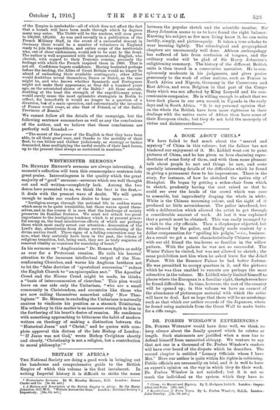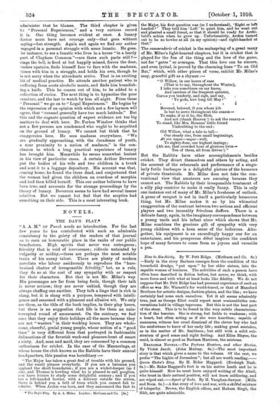DR. FORBES WINSLOW'S EXPERIENCES.f. DR. Founss WINSLOW would have done
well, we think, to, keep silence about the family quarrel which he relates at length. Such statements are justified when a man has to defend himself from unmerited obloquy. We venture to say that not one in a thousand of Dr. Forbes Winslow's readers will have ever heard of the dispute which he describes. The second chapter is entitled "Lunacy Officials whom I have Met." Here our author is quite within his rights in criticising. Public officials are necessarily on trial, and it is well to have- an expert's opinion on the way in which they do their work. Dr. Forbes Winslow is not satisfied ; but it is not so much the individual as the system which they have to
• China : its Marvel and Mystery. By T. Hodgson Liddell. London: Osinrge Allen and Sons. [21s. net]
t Recollections of Forty Years. By L. Forbes Winslow, D,C.L, Lon4on:. John Oneeley. [12s. 6d. net.] administer that he blames. The third chapter is given ta "Personal Experiences," and a very curious record it is. One thing becomes evident at once. A lunacy doctor must have not courage only—that goes without saying—but strength. Again and again we find our author engaged in a personal struggle with some lunatic. He goes. or instance, to see a lunatic who lives in a house " in a lonely part of Clapham Common "—are there such parts still P— rings the bell, is fired at but happily missed, forces the door, rushes upstairs, finds himself face to face with the madman, :closes with him in a struggle, and holds his own, though he is not sorry when the attendants arrive. That is an exciting bit of medical practice. He attends another, patient who is suffering from acute alcoholic mania, and finds him brandish- ing a knife. This he coaxes out of him,_ to be added to a collection of curios. The next thing is to hypnotise the poor creature, and the last to watch by him all night. From these " Personal " we go on to " Legal Experiences." He begins by the expression of an opinion with which not a few laymen will agree, that " counsel generally have too much latitude." But this and the cognate question of expert evidence are too big matters to deal with here. Dr. Forbes Winslow_ thinks that not a few persons are condemned who ought to be acquitted on the ground of lunacy. We cannot but think that he exaggerates here. He sees madness everywhere. "We are gradually approaching, with the decadence of youth, a near proximity to a nation of madmen," is the con- clusion to which a long practical experience of lunacy has brought him. Meanwhile he seems somewhat lenient in his view of particular cases. A certain Arthur Devereux put the bodies of his wife and two children in a trunk and sent it to a luggage depository. His account was that, coming home, he found the three dead, and conjectured that the woman had given the children an overdose of morphia and had then killed herself. This our author believes to have been true, and accounts for the strange proceedings by the theory of lunacy. Devereux seems to have had several insane relatives. But we cannot but feel that the sceptics had something on their side. This is a most interesting book.



























































 Previous page
Previous page